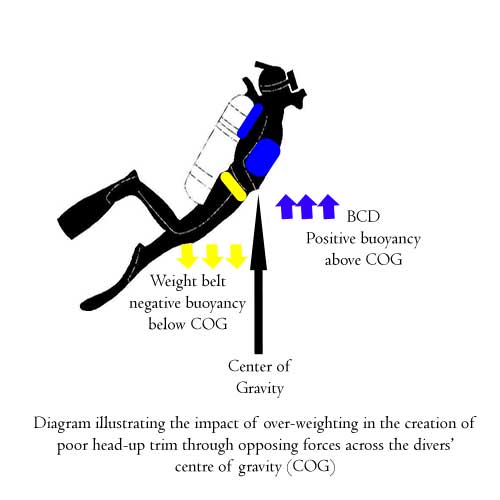So I'm working on becoming a DM and my instructor has given me a homework assignment to explain why being overweighted makes buoyancy difficult. We hear this all the time -- if you wear too much weight, you have a tendancy to pop or have difficultly hovering -- but I don't think I've ever hear a clear, succinct explanation. And frankly, I never really thought that much about it until this assignment. After considering the problem, I decided to post my thoughts here for other to comment on. So here goes.
As we know, buoyancy while diving is the result of two opposing forces, your weight which is the result of the earth pulling you "downward," counterbalanced by the "upward" pressure exerted by the water we displace. In order to become more negative, we use lead, which for its relative weight, displaces very little. It is, therefore, very efficient at creating negative buoyancy.
To become more positively buoyant, we add air, which is at the opposite end of the spectrum -- it weighs very little, but when contained in our bcd bladder, it displaces quite a bit of water.
So, why do we pop? Well, the issue seems to me to come down to the fact that air is compressible (and lead is not). More importantly, for this issue, air does not expand on the way back up in a linear fashion as a function of depth. For example, while ascending from 30 meters to to 10 meters (20 meters total), the volume of air in your BC doubles. It doubles again from 10 meters to the surface. In other words, as you ascend, the rate at which the air expands increases and your buoyancy increases at the same increasing rate. You need to vent faster and faster to prevent the pop. The larger amount of air you have in your bladder to offset the lead (which has constant buoyancy characteristics), the greater the problem. The solution, therefore, is to use a little air as possible (and also therefore to use as little lead as possible).
Gurus, how did I do?
As we know, buoyancy while diving is the result of two opposing forces, your weight which is the result of the earth pulling you "downward," counterbalanced by the "upward" pressure exerted by the water we displace. In order to become more negative, we use lead, which for its relative weight, displaces very little. It is, therefore, very efficient at creating negative buoyancy.
To become more positively buoyant, we add air, which is at the opposite end of the spectrum -- it weighs very little, but when contained in our bcd bladder, it displaces quite a bit of water.
So, why do we pop? Well, the issue seems to me to come down to the fact that air is compressible (and lead is not). More importantly, for this issue, air does not expand on the way back up in a linear fashion as a function of depth. For example, while ascending from 30 meters to to 10 meters (20 meters total), the volume of air in your BC doubles. It doubles again from 10 meters to the surface. In other words, as you ascend, the rate at which the air expands increases and your buoyancy increases at the same increasing rate. You need to vent faster and faster to prevent the pop. The larger amount of air you have in your bladder to offset the lead (which has constant buoyancy characteristics), the greater the problem. The solution, therefore, is to use a little air as possible (and also therefore to use as little lead as possible).
Gurus, how did I do?





